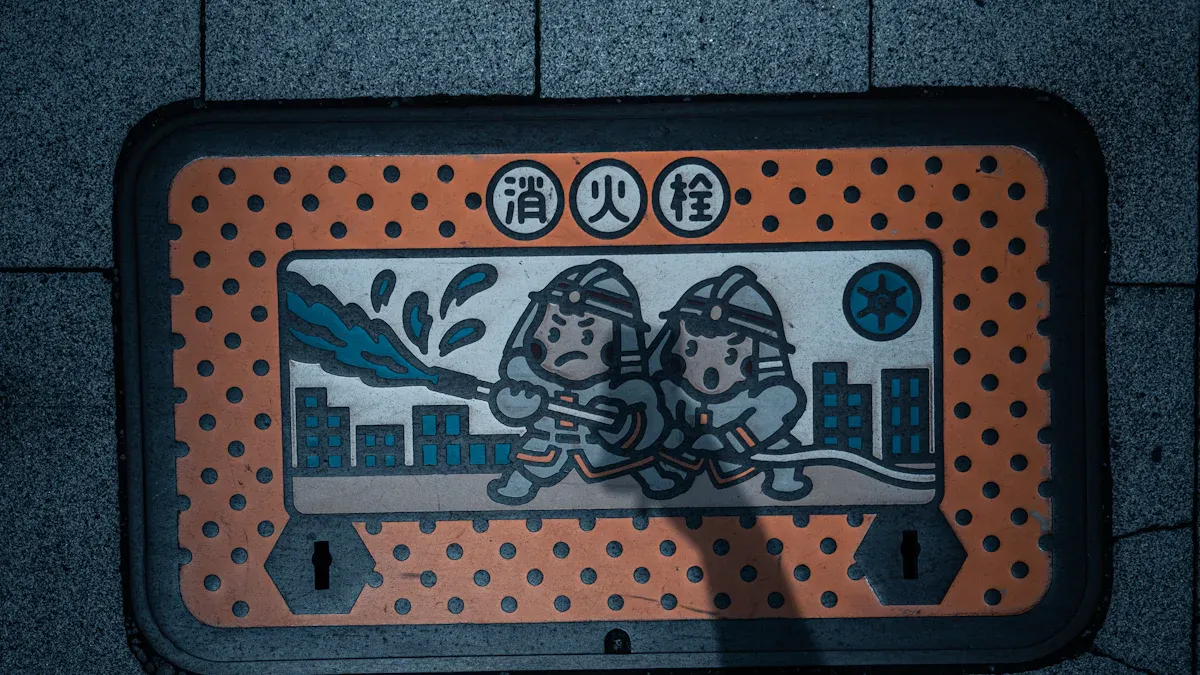Industrial telephones are designed to endure harsh conditions, making reliable waterproofing essential. Constant exposure to water, dust, and other challenging elements can impact their performance. Without adequate protection, even a rugged industrial telephone might not withstand these demands. Waterproofing plays a crucial role in ensuring the durability of devices like an industrial heavy-duty telephone or an emergency explosion-proof telephone, maintaining secure communication in critical environments.
Key Waterproofing Features for Industrial Telephones

Industrial telephones are built to endure tough environments, but their waterproofing features are what truly make them reliable. Let’s explore the key elements that keep these devices functioning even in the harshest conditions.
Sealed Ports and Connectors
Sealed ports and connectors are essential for protecting industrial telephones from water and dust. These features are especially important in environments like manufacturing plants or construction sites, where exposure to harsh elements is unavoidable. By preventing moisture from entering the device, sealed ports ensure uninterrupted communication.
- Designed to handle extreme industrial conditions.
- Provide reliable connectivity, even in remote areas.
- Hands-free capabilities allow users to communicate without holding the device.
This combination of durability and functionality makes sealed ports a must-have for emergency intercom telephones and other industrial devices.
Waterproof Coatings and Materials
The materials used in industrial telephones play a huge role in their waterproofing. Many devices feature die-cast aluminum casings with epoxy powder coatings. These materials not only resist water but also withstand extreme temperatures, ranging from -40°C to 75°C.
For example, handsets made from Cycoloy with stainless steel spiral cords are both durable and weather-resistant. Devices with an IP67 rating offer complete protection against dust and moisture, making them suitable for industries like mining, marine, and chemical plants.
Reinforced Housing and Design
A strong, reinforced housing ensures that industrial telephones can survive physical impacts and water exposure. The design often includes tightly sealed enclosures and robust gaskets to block out moisture. This feature is particularly useful in environments where heavy machinery or unpredictable weather could damage standard devices.
Reinforced designs not only protect the internal components but also extend the lifespan of the telephone. This makes them a reliable choice for industries that demand consistent performance.
Understanding Waterproofing Standards
Waterproofing standards help determine how well industrial telephones can resist water and dust. These standards are often represented by IP (Ingress Protection) ratings, which provide a clear measure of a device’s durability in challenging environments. Understanding these ratings ensures you choose the right telephone for your specific needs.
Overview of IP Ratings
IP ratings consist of two numbers. The first number indicates protection against solid objects like dust, while the second shows resistance to water. For example, an IP67 rating means the device is completely dust-proof and can handle temporary immersion in water. These ratings are essential for industrial telephones used in environments like factories, mines, or marine settings.
ヒント: Always check the IP rating before purchasing a telephone for industrial use. It ensures the device can handle the conditions it will face.
Common IP Ratings for Industrial Telephones (e.g., IP67, IP68)
Industrial telephones often feature IP ratings like IP55, IP66, IP67, or IP68. Here’s a quick comparison of what these ratings mean:
| IP Rating | Dust Protection | Water Protection |
|---|---|---|
| IP55 | Some protection | Resistant to water spray |
| IP66 | Dust-proof | Resistant to strong water jets |
| IP67 | Dust-proof | Temporary immersion in water up to 1 meter for 30 minutes |
| IP68 | Dust-proof | Continuous immersion in water under severe conditions |
Devices with IP67 or IP68 ratings are ideal for industries where water exposure is frequent. For example, IP67-rated telephones can handle accidental splashes, while IP68-rated ones are better for prolonged submersion.
Implications of IP Ratings for Industrial Use
Choosing the right IP rating depends on the environment. For areas with occasional water exposure, an IP67-rated telephone works well. However, industries like marine or chemical plants may require IP68-rated devices for added protection.
- Water Depth and Duration: IP67 handles shallow water for short periods, while IP68 is better for deeper, longer immersion.
- Budget Considerations: IP68 devices often cost more but provide superior durability.
- Longevity: Higher-rated devices tend to last longer in extreme conditions.
By understanding these ratings, businesses can ensure their industrial telephones remain reliable, even in the harshest environments.
Practical Tips for Maintaining Waterproof Performance
Maintaining the waterproof performance of industrial telephones is essential for their longevity and reliability. Regular care and attention can prevent water damage and ensure these devices perform well in harsh environments. Here are some practical tips to help.
Regular Inspection of Seals and Gaskets
Seals and gaskets are the first line of defense against water intrusion. Regular inspections can help identify wear and tear before it becomes a problem.
- Choose gasket materials that match the application’s needs, such as those resistant to extreme temperatures or compressible for a tight seal.
- Ensure the mating surfaces are smooth and flat to prevent leaks. If necessary, machining can improve the surface finish.
- Monitor the pressure on seals to avoid overloading them. Adjusting the contact area or using hard stops can prevent damage.
- Watch for deformation in O-rings, as stress in the groove path can weaken their sealing ability.
- Use potting or conformal coatings to protect sensitive electronics from moisture buildup.
By following these steps, businesses can keep their devices protected and operational.
Proper Installation and Handling
Improper installation can compromise waterproofing. Always follow the manufacturer’s guidelines when setting up industrial telephones. Tighten screws and bolts evenly to maintain a uniform seal. Avoid over-tightening, as this can damage gaskets or seals.
When handling the device, avoid dropping or striking it against hard surfaces. Even a small crack in the housing can allow water to seep in. Proper care during installation and use can go a long way in preserving waterproof performance.
Avoiding Prolonged Exposure to Extreme Conditions
While industrial telephones are built to withstand tough environments, prolonged exposure to extreme conditions can still cause damage. For example, constant submersion in water or exposure to high-pressure jets can wear down seals over time.
Whenever possible, limit the device’s exposure to such conditions. If the telephone operates in a particularly harsh environment, schedule regular maintenance checks to ensure its waterproofing features remain intact. Taking these precautions can extend the lifespan of the device and reduce the risk of failure.
Testing and Verifying Waterproofing

Testing waterproofing is essential to ensure industrial telephones perform reliably in harsh environments. Both simulated and real-world testing methods help verify their durability and resistance to water damage.
Simulated Environmental Testing
Simulated testing recreates challenging conditions in a controlled environment. Manufacturers use this method to evaluate how well a device withstands water, dust, and temperature extremes. For example, they might submerge a telephone in water or expose it to high-pressure jets to test its seals.
These tests often follow international standards, like IP ratings, to ensure consistency. Simulated testing allows manufacturers to identify weaknesses before the product reaches the market. It’s a critical step in ensuring industrial telephones meet the demands of tough environments.
Field Testing in Real-World Scenarios
Field testing takes waterproofing evaluation a step further. It involves using the telephone in actual industrial settings, such as factories, mines, or marine environments. This method helps determine how the device performs under real-world conditions.
For instance, a telephone might be installed in a chemical plant to see how it handles prolonged exposure to moisture and corrosive substances. Field testing provides valuable insights that lab tests might miss, ensuring the device is truly ready for industrial use.
Importance of Routine Maintenance Checks
Even the best waterproofing can degrade over time. Routine maintenance checks help identify issues like worn seals or damaged gaskets before they cause problems. Regular inspections ensure the device remains water-resistant and reliable.
Maintenance teams should clean the device, check for cracks, and replace any damaged components. These simple steps can extend the lifespan of industrial telephones and prevent costly downtime.
ヒント: Keep a maintenance schedule to ensure waterproofing features stay in top condition.
Waterproofing ensures industrial telephones perform reliably in harsh environments. Key features like weather-resistant materials, sealed ports, and reinforced designs protect against water and dust. Regular maintenance, including inspecting seals and avoiding prolonged exposure to extreme conditions, extends their lifespan. By implementing these techniques, businesses can maintain communication efficiency and safety in critical settings.
よくある質問
What does an IP67 rating mean for industrial telephones?
An IP67 rating means the telephone is dust-proof and can handle temporary immersion in water up to 1 meter for 30 minutes. 🌊
How often should seals and gaskets be inspected?
Inspect seals and gaskets every three to six months. Regular checks help identify wear and prevent water damage before it becomes a problem. 🔍
Can waterproofing features handle extreme weather conditions?
Yes, most industrial telephones with high IP ratings can withstand extreme weather. However, prolonged exposure to harsh conditions may still require regular maintenance. ☔


